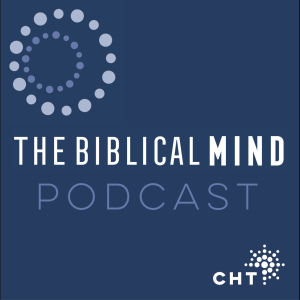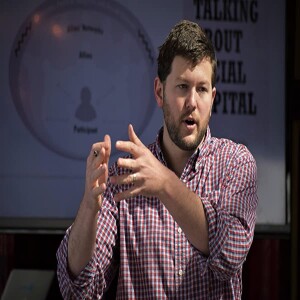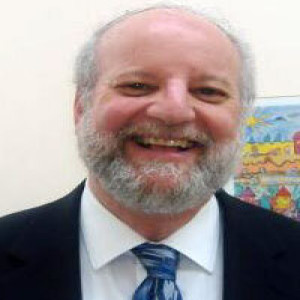The Biblical Mind
The Biblical Mind is dedicated to helping its audience understand how the biblical authors thought, promoting Bible fluency through curious, careful reading of Scripture. It is hosted by Dr. Dru Johnson and published by the Center for Hebraic Thought, a hub for research and resources on the intellectual world of the Bible.
The Biblical Mind is dedicated to helping its audience understand how the biblical authors thought, promoting Bible fluency through curious, careful reading of Scripture. It is hosted by Dr. Dru Johnson and published by the Center for Hebraic Thought, a hub for research and resources on the intellectual world of the Bible.
Episodes

Friday Nov 04, 2022
Our Complicated History with Evil (Discover Your Roots Season 2 Premiere)
Friday Nov 04, 2022
Friday Nov 04, 2022
Hitler is evil. Helping an old lady cross the street is good. Simple, right? But there’s an underlying question here: Why? What are good and evil?
In this crossover with our partner organization Passages Israel, Dru Johnson (CHT Director) and Mattanah DeWitt kick off Season 2 of Discover Your Roots, which aims to unpack weighty questions about the nature of good and evil. In this episode, Dru gives an overview of the season, walking us through a few common conceptions (and misconceptions!) about good and evil through the lens of psychology, philosophy, culture, and—ultimately—Scripture. The whole season is available here!
Discover Your Roots is produced by Passages Israel. Passages sponsors and coordinates journeys to the Holy Land to strengthen the faith of Christian students, connect them to Israel, and prepare them for a life of Christ-centered leadership.
Show notes:
0:00 Announcing the upcoming CHT event in NYC
1:23 Introducing Season 2
2:20 How modern culture thinks about evil
7:40 Definitions of evil
9:57 The theological history of evil
13:42 The Hebrew word ra
15:20 Why our words lose their weight
17:07 An overview of the Bible's view
21:59 God using evil for good
23:29 Analyzing the golden calf story
27:29 Turning toward good
29:41 The redemption of the world
32:23 Preview of the rest of the season
Show notes by Micah Long

Friday Oct 21, 2022
Moving from Egypt to the U.S. as a Coptic Christian (Mariam Wahba)
Friday Oct 21, 2022
Friday Oct 21, 2022
Dru interviews Mariam Wahba, a Coptic Christian born in Egypt who immigrated to the U.S. as a child. They discuss the multiple facets of her identity and experience, including how being a Coptic Christian shaped everything from her interactions with Muslim Egyptians to how she now celebrates holidays in the U.S. She also describes some of the distinctives of Coptic Christianity, in contrast with Western Christianity, and explores the tension between cultural assimilation and retaining one's native identity as an immigrant.
Mariam Wahba is the Associate Directory of Advocacy at the Philos Project. A graduate from Fordham University, she works in the areas of Middle Eastern foreign policy, religious freedom, and Israeli-Arab relations. She co-hosts the podcast Americanish.
Show notes:
0:00 Moving to the United States
3:11 Egyptian and Coptic identity
7:50 Growing up in Islamic Egypt
11:00 Ethnic and religious identity
12:20 Moving to the west
16:30 Cultural assimilation and retaining identity
18:56 Coptic Christianity
23:47 Confession, intercession, and priesthood
25:51 The Coptic church calendar
30:04 Persecuted Christianity versus cultural Christianity
34:19 The most important part of being Egyptian
Show notes by Micah Long

Friday Oct 14, 2022
The Pitfalls of Children’s Bibles (Rachel Wilkowski)
Friday Oct 14, 2022
Friday Oct 14, 2022
"Why wasn't I trained to read this way as a child?" —Rachel Wilkowski
Over the last several decades, the Christian world has eagerly produced a host of children's Bibles—retellings of biblical stories in "kid-friendly" language, complete with cute, colorful illustrations. Many of these children's Bibles, however, come laden with assumptions about the nature of childhood, which parts of Scripture are considered appropriate, and what "lesson" the stories teach. Rachel Wilkowski, a researcher in the area of children's Bibles, joins Dru Johnson to discuss history and pitfalls of these books. They discuss the impacts of "pre-interpreting" the biblical texts for children, including the propensity toward moralism and sanitizing some of the difficult parts of Scripture. They also consider how religious beliefs and the publishing industry combine to shape what is presented in these retellings of Scripture.
Rachel Wilkowski is a PhD student at Trinity College Dublin and Family Ministries Director at St. Peter's Fireside in Vancouver. She has particular research interest in how Genesis 1-3 (and other parts of the Hebrew Bible) are interpreted and retold in children's Bibles from different Jewish and Christian traditions. She has 14 non-biological nieces and nephews and one biological nephew.
Show notes:
0:00 Rachel's interest in children's Bibles
4:18 The history of children's Bibles
8:38 Religious beliefs and retelling Scripture
12:05 What is considered appropriate for kids?
15:33 Examples of poor retellings
19:57 Sales, illustrations, and entertainment
24:14 A children's Bible that gets it?
26:42 Helping kids read Scripture
29:41 Avoiding pre-interpreting Scripture and moralism
Show notes by Micah Long

Friday Oct 07, 2022
Israelites vs. Hebrews vs. Jews . . . ? (Jason Staples)
Friday Oct 07, 2022
Friday Oct 07, 2022
What do we mean when we say that "Jesus was a Jew?" Scripture uses a lot of labels to refer to God's chosen people, including "Israelite," "Judahite," "Hebrew," and, of course, "Jew." In this episode, Jason Staples helps us sort through the etymologies, histories, ethnicities, and nationalities behind these labels, examining the earliest usage of "Jew" in the Hebrew Bible, its role in the Second Temple Period, and its interpretations in the modern era. He also considers key Bible passages that use these labels and helps debunk a common assumption about "Jew" as a pejorative term.
Jason Staples teaches at North Carolina State University in the areas of biblical literature, early Judaism and Christianity, and modern issues in ethics and religion. He is the author of The Idea of Israel in Second Temple Judaism: A New Theory of People, Exile, and Israelite Identity. In addition to his scholarly work, Jason has worked in sports media and voiceover narration.
Show notes:
0:00 The history of the word "Jew"
3:54 "Jew" versus "Israelite" in Scripture and beyond
9:12 Jewish nationality and ethnicity after the exile
14:33 What happened to the other tribes?
15:50 Jesus was a Jew
20:23 "King of the Jews" and King of the universe
21:58 "The Israel of God"
26:09 Paul as an Israelite and a Hebrew
Show notes by Micah Long
Credits for the music used in TBM podcast can be found at: hebraicthought.org/credits.

Friday Sep 30, 2022
Growing Up Christian in the Gaza Strip (Khalil Sayegh)
Friday Sep 30, 2022
Friday Sep 30, 2022
In this week's episode, Khalil Sayegh shares his experience as a Palestinian Christian. The territory of Palestine contains two regions: the West Bank and the Gaza Strip. Though they share a people and a history, the two areas are separated by the country of Israel and are ruled by two different governments (the West Bank by the Palestine Liberation Organization and the Gaza Strip by Hamas). Khalil discusses the modern political and religious dynamics at play in the Gaza Strip, including the relationships between Israel and Hamas and between Islam and Christianity. He also surveys Christianity in Palestine, from its use of Scripture to its approach to evangelism.
Khalil Sayegh is a Fellow at the Philos Project. He grew up in the Gaza Strip and currently lives in the West Bank. His public work focuses on challenging the negative perceptions of Jewish people in Palestinian society and promoting peace among the various religious groups in the region. He has studied at Bethlehem Bible College and American University.
Show notes:
0:00 Growing up in Gaza
1:54 War, mobility, and Christianity in Gaza
5:35 Sunni Islam and political parties
7:24 Gaza's Christian churches
9:15 Interactions between Christianity and Islam
11:03 Political power in Gaza
14:36 Christmas, Hamas, and public Christianity
16:27 Conditions for visiting the West Bank
19:30 Views of Christian Scripture in Palestine
26:11 Evangelism and responses to conversion
28:22 Cultural distinctives of the Palestinian church
Show notes by Micah Long

Friday Sep 23, 2022
Revelation 101: Leaving Behind Left Behind (Jason Staples)
Friday Sep 23, 2022
Friday Sep 23, 2022
"This is a revelation of how things are, not so much how things have been." -Jason Staples
Modern Christians reading the Book of Revelation tend to filter it through the lens of popular fiction (such as the Left Behind series) and a very modern concept of its strange language and imagery. From the four horsemen, to the secret thunder in chapter 10, to the mixing of metaphors throughout the text, Revelation presents a challenge for modern readers.
In this episode, Dr. Jason Staples (Assistant Teaching Professor at North Carolina State University) helps sort through the symbols in the Book of Revelation. By examining the historical context of late Second Temple Judaism, the genre of apocalypse, and key passages from the Hebrew Bible, the meanings of the symbols begin to emerge. Though many passages remain mysterious, even to trained scholars, the Book of Revelation communicates a message of central importance about the present Kingdom of God and the role of the church in the world.
Jason Staples teaches in the areas of biblical literature, early Judaism and Christianity, and modern issues in ethics and religion. He is the author of The Idea of Israel in Second Temple Judaism: A New Theory of People, Exile, and Israelite Identity. In addition to his scholarly work, Jason has worked in sports media and voiceover narration.
Show notes:
0:00 Signs and symbols
2:40 Understanding ancient reading norms
6:42 Finding context for Revelation in other literature
8:02 The Jewish experience in the 1st and 2nd centuries
14:16 Defining the apocalypse genre
19:40 Revelation and the Kingdom of God
23:31 Mystery and God's control
26:20 Reading the Hebrew Bible to understand Revelation
32:42 New Heavens and the New Earth
Show notes by Micah Long

Friday Sep 16, 2022
Would Moses Forgive Student Debt? (Michael Rhodes)
Friday Sep 16, 2022
Friday Sep 16, 2022
The Biden Administration's recent student debt forgiveness act in the U.S. has sparked conversations—many of them heated—about the nature of fairness, justice, poverty, and economic well-being.
In this episode, Michael Rhodes joins Dru to discuss debt forgiveness in Scripture and the modern world. Rhodes surveys the radical Torah policies of cyclical debt forgiveness and the Year of Jubilee, and how they contrast with the debt forgiveness policies in the rest of the ancient Near East. A world of subsistence farming where predatory loans can create cycles of debt slavery and intergenerational poverty may not immediately seem similar to modern America—but on a closer look, similarities appear.
Michael Rhodes is a Lecturer in Old Testament at Carey Baptist College in New Zealand. He has worked on community development programs in Kenya and South Memphis, and has also served as a pastor. His academic research focuses on the nature of justice and mercy in Torah economics and ritual meals in Scripture. He is also co-author of Practicing the King's Economy: Honoring Jesus in How We Work, Earn, Spend, Save, and Give.
Show notes:
0:00 Debt entrapment and debt slavery
2:53 Predatory lending in the ancient Near East
4:19 Modern American versus ancient Israelite debt forgiveness
7:44 One-off debt forgiveness in the Bible
9:33 Subsistence farming and for-profit colleges
15:15 Intergenerational poverty
22:06 The issue of fairness
26:24 Righteousness, justice, and equity in Deuteronomy and Proverbs
31:04 The ends and means of debt forgiveness
32:26 Jesus and Jubilee
Credits for the music used in TBM podcast can be found at: hebraicthought.org/credits.

Friday Sep 09, 2022
A Jewish View of the Afterlife in the Hebrew Bible (Jeremiah Unterman)
Friday Sep 09, 2022
Friday Sep 09, 2022
For Christians accustomed to certain ideas of heaven and hell, other views of the afterlife in Scripture may seem strange. But Jewish views of the afterlife have a storied and fascinating tradition of their own. In this episode, Dru is joined by Dr. Jeremiah Unterman, Senior Fellow at the Center for Hebraic thought. They discuss Jewish views of the afterlife from the ancient to modern times, encountering the concepts of sheol, ruach, gehenna, immortality, and judgment. Dr. Unterman offers perspectives on the story of Saul and the Necromancer, the phrase "gathered to their fathers," burial practices of the ancient Near East, and the role that theodicy plays in developing Jewish views of the afterlife.
Jerry Unterman is a Resident Scholar at the Herzl Institute, former professor (Yeshiva University, Northwestern University, and others), an author, and Senior Fellow at the Center for Hebraic Thought. In 2017, he released Justice for All: How the Jewish Bible Revolutionized Ethics, a look at the influence of the Hebrew Scriptures on the values and practices of the modern world.
Show notes:
0:00 Sheol and polytheism
1:37 Egyptian versus Hebraic views of the afterlife
4:09 Death in the Torah and Psalms
6:07 The Necromancer of Endor
9:18 Burial and "raising up"
13:20 Hellenistic Judaism
17:13 The idea of the soul and the world to come
21:46 Greek versus Hebrew thought in the Apocrypha
24:30 Medieval and Modern Jewish perspectives on the afterlife
29:08 Looking at the New Testament
33:40 The Talmud on Gehenna
Show notes by Micah Long
Credits for the music used in TBM podcast can be found at: hebraicthought.org/credits.

Friday Sep 02, 2022
Thinking Biblically about Institutions (Ari Lamm)
Friday Sep 02, 2022
Friday Sep 02, 2022
The Bible tells stories about individuals, families, and nations. But it also tells stories about institutions—the chosen and unchosen social structures that range from marriage, to news media, to the Supreme Court. Today, many people see major institutions as weak, corrupt, or untrustworthy (sometimes correctly). In this episode, Dru welcomes Rabbi Dr. Ari Lamm back to the podcast for the fourth time to discuss the idea of institutions in the Hebrew Bible. Ari surveys the role of institutions the biblical narratives, looking at the earliest chapters of Genesis, the story of Abraham, the golden calf narrative, and the nations of Egypt and Babylon. They also discuss the right response to broken and corrupt institutions, the dangers of "spiritual highs," and the corrective role of prophetic voices.
Rabbi Dr. Ari Lamm is the CEO of Bnai Zion, an organization that aims to strengthen Israel and Jewish people, as well as the host of Good Faith Effort, a podcast that examines the Bible and its interactions with society. He studied Judaism and Christianity at University College London and Princeton University, and received his rabbinical ordination at the Rabbi Isaac Elchanan Theological Seminary. He frequently writes and speaks about Jewish values and their positive impact on the world.
Show notes:
0:00 The biblical view of institutions
2:30 Biblical "false starts"
7:15 Abraham and the Bronze Age
10:07 How institutions come to exist
14:27 Unchosen obligations
19:40 Egypt and Babylon
23:38 Being born into corrupt systems
27:22 Spiritual awakenings and religious practices
34:08 The most important verse in the Bible
36:36 The political structure of biblical Israel
44:48 Dealing with broken institutions
Show notes by Micah Long

Friday Aug 26, 2022
The Bonhoeffer of Ethiopia (Abeneazer Urga)
Friday Aug 26, 2022
Friday Aug 26, 2022
Amid persecution from the Marxist state and a fragmented Ethiopian church, Gudina Tumsa became a figure who advocated a holistic theology of justice, church unity in Ethiopia, and the health and strength of the church more broadly. In this episode, Dru asks Abeneazer Urga about his book The Bonhoeffer of Africa, a biography of Ethiopian theologian Gudina Tumsa. Tumsa's life has brought him comparisons to Martin Luther King, Jr. and Dietrich Bonhoeffer. Along the way, Dru and Abeneazer discuss the state of the church in Ethiopia, from its fourth-century roots to its Christological theology to the way the Western church differs from the modern Ethiopian church.
Abeneazer Urga teaches at the Evangelical Theological College in Ethiopia and is a member of Equip International. He specializes in New Testament and Missiology and has done work exploring holistic theology and theology from an African perspective.
Show notes:
0:00 The history of Christianity in Ethiopia
3:35 Modern Ethiopian Christianity
6:11 Christology in the Ethiopian Orthodox Church
9:32 The persecution and influences of Gudina Tumsa
15:57 Tumsa in the United States
20:41 Practicing holistic theology
22:50 Unity of the Ethiopian church
25:53 The evangelical movement in Ethiopia
28:20 Tumsa and the youth of Ethiopia
29:55 Abeneazer's experience in modern Ethiopia and the United States
Show notes by Micah Long
Credits for the music used in TBM podcast can be found at: hebraicthought.org/credits.






